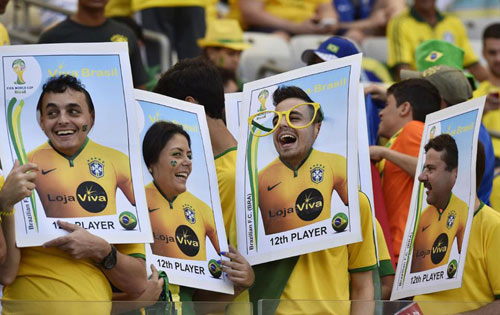|
查看原文
A poll published Sunday on the wealth and race of fans who attended a World Cup match in Brazil illustrated what any TV viewer in the nation has seen: Those attending games are overwhelmingly white and rich.
That's particularly striking in Brazil, with its highly mixed population that has more blacks than any country with the exception of Nigeria. More than half of Brazil's population self-identified themselves as black or of mixed-race in the 2010 census.
A Datafolha polling group survey published in the Folha de S. Paulo newspaper showed that at Saturday's Brazil versus Chile match, 67 percent of attendees classified themselves as white and 90 percent came from Brazil's top two economic classes, which represent about 15 percent of the country's population.
Similar trends have been seen at other Cup matches, though no polls were carried out previously.
The Datafolha poll was based on interviews with 693 fans at the Mineirao stadium in Belo Horizonte and had a statistical margin of error of 4 percentage points.
"Sure, there are only whites in the stadium. It comes down to money," said Ana Beatriz Ferreira, a 27-year-old parking attendant in Rio de Janeiro, who is black. "Nobody I know could find affordable tickets."
That's become a common refrain in Brazil - where the billions spent to build new or upgrade existing football stadiums both raised public ire about how the money was spent and has already caused ticket prices for Brazilian national soccer league matches to rise sharply. Some fans complain that's turned what were once affordable, raucous stadium experiences in Brazil into more costly and less spontaneous visits to storied stadiums like Rio's Maracana.
Ferreira added that while the entire Brazilian population has suffered during preparations for the World Cup, mostly because of big construction projects that have snarled traffic and extended already long commutes for the poor who live on the outskirts of cities, she feels like only the rich are reaping the benefits of the real World Cup experience.
"All I got was an extra hour on the bus to work, but I can't get a seat at the stadium," she said as she directed cars toward a mall's parking garage in Rio's wealthy southern zone.
Face-value prices for the Brazil versus Chile match officially ranged from $200 to $25 for Brazilians, the cheapest tickets making up roughly 5 percent of those sold. They were only available for students, senior citizens or poor people who participate in a government welfare program.
The prices are tough for ordinary Brazilians to afford. The minimum wage in the country is $330 a month, just about what Ferreira said she earns.
In an emailed statement, FIFA said that during group stage matches, it sold a total of 143,364 of the cheapest tickets, which amounted to roughly 3,000 such tickets available per match.
Those quickly sold out, locking out the vast majority of fans in soccer-mad Brazil.
Marcos Carvalho, an 18-year-old Brazilian fan who was hanging out near the Estadio Nacional in Brasilia before Brazil played Cameroon earlier this week, said that he "didn't even try getting tickets, they were too expensive."
"There was no way we could afford them," he said. "We'll just watch the match at home, it's all we can do. We are seeing everyone going to the stadium, everyone happy, but we won't be going."
|
查看譯文
昨日公布的一項(xiàng)調(diào)查顯示�,就像全國觀眾在電視機(jī)前所看到的一樣,買球票來場邊觀戰(zhàn)的����,絕大多數(shù)是白人和富人。
這一現(xiàn)象值得注意�����。巴西是個(gè)多種族國家�,黑人占總?cè)丝诒壤痪邮澜绲诙?����,僅低于尼日利亞�。在2010年的人口普查中,超過一半的巴西人認(rèn)為自己是黑人或混血兒����。
這份刊登在圣保羅報(bào)上的調(diào)查結(jié)果顯示,在周六巴西和智利的比賽中�����,67%的現(xiàn)場觀眾稱自己是白人,而90%的觀眾來自巴西兩大頂尖經(jīng)濟(jì)階層���,約占全國人口的15%�。
在其他杯賽中����,盡管沒有做調(diào)查,但同樣也呈現(xiàn)出類似趨勢���。
圣保羅報(bào)的民意調(diào)查是基于在貝洛奧里藏特(Belo Horizonte)的米內(nèi)朗球場( Mineirao)對693名球迷進(jìn)行的采訪��,統(tǒng)計(jì)誤差為4%左右�����。
今年27歲的黑人安娜(Ana Beatriz Ferreira)是里約的一名看車員��,她說:“門票那么貴����,當(dāng)然只有白人才買得起����,進(jìn)去看球怎么可能輪到我�?”
巴西政府動用數(shù)十億資金建立新球場或擴(kuò)建現(xiàn)有球場已觸發(fā)眾怒����,并導(dǎo)致票價(jià)飛漲,這是路人皆知的事情���。對此��,一些球迷抱怨���,曾經(jīng)負(fù)擔(dān)得起的現(xiàn)場體驗(yàn)變得更加昂貴����,想要去諸如馬拉卡納等傳奇球館的熱情也變淡了。
安娜還補(bǔ)充道���,在巴西籌辦世界杯期間��,巴西人民卻在遭罪�。由于大型建設(shè)項(xiàng)目造成交通擁擠����,耽誤了居住在城市郊區(qū)窮人的上下班時(shí)間����,她認(rèn)為只有富人才會在世界杯倍感享受�。
安娜上班的地方位于富人區(qū)的一家購物中心的車庫,她抱怨道:“我去上班的路上要多花費(fèi)一小時(shí)�����,但我卻得不到一個(gè)現(xiàn)場看球的機(jī)會�����?!?/p>
巴西對智利比賽的正式票價(jià)范圍在200美元到25美元之間。最便宜的門票大約占5%的銷售額����。這些門票只為學(xué)生、老年人和政府福利計(jì)劃的窮人提供����。
安娜的工資也就是巴西的最低月薪,僅330美元����。因此門票對普通老百姓來說實(shí)在過于昂貴��。
在一份電郵聲明中���,國際足聯(lián)表示,在小組賽中����,三等票總計(jì)售出143364張,相當(dāng)于每場比賽就賣出了3000張�。
門票很快銷售一空,只是大多卻不是落到鐵桿球迷的手中�。
馬科斯卡瓦略是一名18歲的巴西球迷,本周早些時(shí)候����,在巴西利亞國家體育館閑逛的他表示:“我們甚至壓根就沒想過買票這事。門票太貴了�,我們根本買不起�����,能做的也就是在家看看球了��。我們看著去那些現(xiàn)場觀戰(zhàn)興高采烈的人們�,但我們自己卻去不了��,這真令人難過��?!?/p>
(譯者 HATA 編輯 丹妮)
掃一掃�,關(guān)注微博微信
 
|


